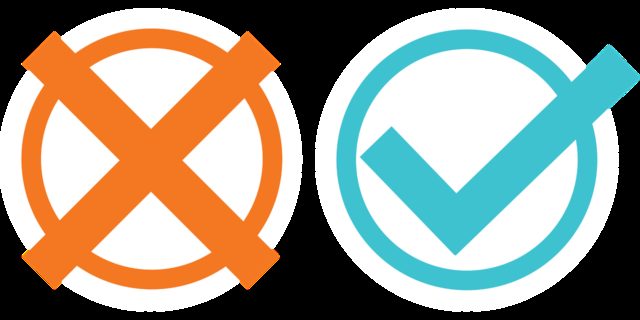No matter how new you are to my site, and no matter how few or how many of my posts you have read, I hope you realize that while my main goal is to do whatever I can to help you build your study skills, another important goal I have is to help you approach your studies more positively. Striving to increase your confidence with your work by building on your successes is an important part of this, which will only become more and more obvious the more you are able to do it. An equally important part of becoming more positive about your work is much less obvious, and can seem at times to be nearly impossible, but that doesn’t mean you shouldn’t do all you can to work on it. You may not want to learn from your failures, or use them to build your study skills, and it may seem nearly impossible to find something positive in them, but it can be done if you take the time to look at them honestly and figure out what you can do to make improvements. As hard as it can be to do, try to resist the urge to make snap judgements, not just about why you did poorly, but also about where you decide to place the blame. While being too hard on yourself is not the answer, neither is being too hard on anyone else. The two easiest reactions to failure are deciding you can’t learn and deciding your teacher can’t teach, and what makes them so easy is that very little thought goes into them. They are both very emotional responses, born out of frustration and anger, and what they have in common is that the more you stay focused on them, the less you are able to learn, not just from the failures that led to these reactions, but also from any advice or suggestions that may lead to more positive outcomes in the future. Getting past negative emotions that come with failures so you can find positive solutions is not nearly as easy as building on the positive emotions that come with success so you can have even more success, but being able to do both is an important part of your study skills journey.
When you do poorly on a test, an assignment, or a project, it can be only too easy to decide you can’t learn the material, whether in general, in a particular subject, or with a particular type of assignment. This is especially true if you feel you put effort into your work, or made sure to study all the material for your test, and even more true if you feel you applied study skills to what you were doing. While it can be frustrating to feel like you are are not doing enough, or maybe never will do enough, to see the amount of improvement you are hoping to see, taking a more honest and realistic look at where you went wrong, as well where you were able to make some improvement, will give you the best chance to see even more improvement over time. Take the time to review your errors, as well as any teacher feedback, and be sure to speak to the teacher if anything is unclear. Make sure you truly followed all the directions on the assignment the best you could, and ask for any clarification of directions you might be able to use on a future test or assignment. If you left any answers blank or incomplete, take the time to learn the information you missed, especially if it is something that you might need to build on later in the course or to know for any cumulative assignment or test. In addition to reviewing your errors, make sure you also review your efforts to apply study skills. Did you start your assignment or project, or preparation for your test, soon enough? Did you make sure to vary your test preparation methods, complete them soon enough to be able to study them, and make the best use you could of both teacher-assigned methods and methods you find work for you? These are only some of the many questions you should ask yourself so you can learn from your failures. You won’t need them all every time, and answering even one question with a view to seeing future improvement can be more than enough to guarantee that you will learn something that will help you feel more positive and keep you from being too hard on yourself.
In addition to thinking of ways to learn from your failures that will keep you from being too hard on yourself, you should also think of ways to learn from your failures that will keep you from being too hard on your teachers. While it may be tempting to place blame on them for your failures, especially if they teach subjects you struggle in or if they employ teaching methods which are not the ones you prefer, learning from your failures will still require you to take an honest and realistic look at where you may have gone wrong. While no teachers are perfect, and some are better than others at admitting when they do make mistakes, most of them want to make sincere efforts to help you when you need it. If you feel strongly that a teacher has said or done something that impacted your ability to succeed on a certain test or project, you should ask to speak to him or her about it, but if you do, make sure you are prepared to listen to what he or she has to say in response to your concerns. Has this teacher previously offered help that you did not avail yourself of? If the teacher responds to your concerns by offering assistance going forward, will you be willing to accept it? If the teacher points out that there are things you could have done to increase your chances of success on the failed test or assignment, will you be willing to do those things on future tests and assignments? If you feel that what the teacher suggests is not something you will be able to do, are you willing to seek other assistance? These are only some of the many questions you should ask yourself so you can keep from placing too much blame on your teachers for your failures. You won’t need them all every time, and answering even one question with a view to seeing future improvement can be more than enough to guarantee that you will learn something that will help you feel more positive and keep you from being too hard on your teachers. As long as you remember that your teachers want to help you, and try to see things from their perspective when you ask for help, just as they will try to see things from your perspective when they offer their assistance, you will be more open to taking the suggestions they offer, which will give you an even better chance to turn your failures into success in the future.
Thinking of ways to learn from your failures that will keep you from being too hard on yourself and/or your teachers is an important part of using those failures as springboards to future successes, but it is far from the only thing you should do to become more positive about your work. The development of good study skills is about a lot more than moving from test to test, assignment to assignment, or grade to grade. If moving from distinct event to distinct event is all you focus on, then, as a popular saying goes, you will miss the forest for the trees. In addition to learning from any distinct failure, or celebrating any distinct success, it important to remember to take the rest of the time to apply everything you learn from both failures and successes to the remainder of the work you have to do. Becoming more organized, planning ahead, using your time more wisely, and learning and applying new study methods to your work are just some of the many ways you can approach your work, not just more positively, but more proactively as well. While you may still see some failures along the way, being proactive will not only lead to more successes than failures, it will also make failures easier to learn from, because you will be better able to take them in stride and continue on your study skills journey. The more you work to develop your study skills, the more positive your overall school experience will become. The more positive your overall school experience becomes, the less negative an impact any failure will have, because you will be better prepared to accept it, learn from it, and move on to more positive things.
Though it may be hard to consider, an important part of improving your study skills is a willingness to learn from failure as well as from success. Making an honest assessment of where you went wrong without being too hard on yourself or your teachers and being willing to accept their suggestions of improvements you can make will help you learn from your failures, while being proactive about the development of your study skills will increase your chances of success. The more willing you become to learn from failure as well as from success, the less failure you will see, and the more able you will become to take failure in stride. Having a positive outlook on your studies through the development of your study skills is the best way to ensure that even when you do experience failure, learning from it will only lead you further down the path to success.

